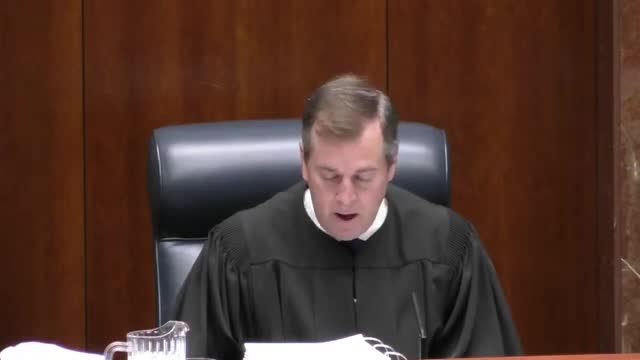Supreme Court weighs who bears risk of pipeline balancing under MAG‑5 contract in American Midstream v. Rainbow Energy
Get AI-powered insights, summaries, and transcripts
Subscribe
Summary
At oral argument the court focused on whether section 9.1 of the parties' MAG‑5 agreement excuses American Midstream from performance when Transco issues operational flow orders (OFOs) and on whether Rainbow's lost‑profits damages meet Texas's reasonable‑certainty standard.
A three‑justice panel of the Supreme Court of Texas heard argument Tuesday in American Midstream v. Rainbow Energy Marketing Corp., a contract dispute over the parties' MAG‑5 balancing agreement and whether operational flow orders issued by Transco relieved American Midstream of its obligations. Counsel for the petitioner and the respondent disagreed about whether section 9.1 of the MAG‑5 excuses performance when Transco asks shippers to balance receipts and deliveries.
Why it matters: The case turns on contract construction that could determine liability for commercial trading losses and on the admissibility and sufficiency of a damages model that Rainbow used to calculate lost profits. The court's ruling will affect how balancing agreements and pipeline OFOs are interpreted in industry contracts and whether high‑risk, hypothetical profit models can sustain large damages awards.
At argument, counsel for the parties framed the dispute in two parts: (1) whether the trial court misread section 9.1 by inserting a scheduling requirement that the petitioner says does not appear in the contract, and (2) whether Rainbow’s damages model satisfies Texas’s reasonable‑certainty standard. The petitioner argued that the trial court “explicitly rewrote section 9.1” and that, as written, the MAG‑5 places the risk of an OFO on Rainbow, preventing it from using MAG‑5 balancing when Transco required shipper balance. The respondent argued the trial court permissibly relied on trade practice, industry custom and the parties’ course of dealing to interpret receipts and deliveries in the MAG‑5 and that the evidence supports the lower‑court judgment.
Several justices questioned how OFOs were drafted and applied in practice. Counsel pointed the court to an OFO in the bench exhibits and to instant messages between gas schedulers from November 22, 2016, that the petitioner says show Rainbow did not nominate service beyond a freely offered 15,000‑dekatherm balancing amount. The record includes at least seven breach days identified by the trial court; the petitioner says written OFOs or critical alerts were in effect on all but one of them.
On damages, petitioner counsel told the court the damages expert’s “hindsight‑driven lost‑profits model” lacked historical grounding and that Rainbow never used the alleged high‑risk trading strategy during 25 years of operations or during the ten months the MAG‑5 was in effect. Respondent counsel replied that industry evidence, pooling agreements and the parties’ practices supported the trial court’s factual findings and that reasonable jurors could infer repudiation or continuing breach in certain December 2016 communications.
The court also explored doctrinal questions about repudiation versus breach in a continuing‑performance contract and whether subsequent months of performance could constitute retraction of an earlier repudiation. Counsel cited Saunders and Glass v. Anderson as precedent on those topics and argued whether the December 7, 2016 phone call constituted an unequivocal refusal to perform.
The case was submitted after argument and the court took the matter under advisement. A decision will clarify whether section 9.1, as written, bars Rainbow’s claims when Transco issues OFOs and whether Rainbow’s damages evidence can survive Texas’s reasonable‑certainty test.
Ending: The court heard extensive questioning from multiple justices and took the case under submission after roughly an hour of argument.
